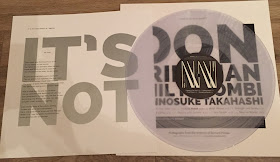I'm what you'd call a music enthusiast. Not one of those obsessive people, but definitely fanatical about it. This blog began as a forum for whatever I am listening to throughout the day but I'm also trying to include full-blown CD reviews too.
Wednesday, November 02, 2016
CD Review: Don Friedman - Strength and Sanity
Don Friedman
Strength and Sanity
(Newvelle) www.newvelle-records.com
Last summer I found a used copy of Out Front by Booker Little. I knew the trumpeter largely for the three albums that collected a performances at the Five Spot in Eric Dolphy's quintet, as well as Max Roach's Percussion Bitter Sweet. On all of these recordings, Little displays a voice unlike any other in the hard bop era. He had the technique of Lee Morgan or Freddie Hubbard, but his sense of melodic possibilities was closer to the avant-garde, or really to Dolphy. Like his reed playing partner, he wasn't blowing free. He was bringing a new perspective to chordal music and making it work powerfully.
Little died in 1961 of complications from uremia, at the age of 23. The potential he had, coupled with the death at such a young age, puts him in a rarefied league of jazz musicians that should have been, right up there with fellow trumpeter Clifford Brown, bassist Scott LaFaro and pianist Richard Twardzik. Dolphy could also be lumped in with this group, although he managed to release a vast number of albums before passing away in 1964. Booker Little only recorded a couple.
For Out Front, Little essentially recruited his bandmates from the Roach group: Dolphy, Roach (who plays tympani and vibes as well as traps), Julian Priester (trombone) and Art Davis, alternating with Ron Carter (bass). A 25-year old pianist named Don Friedman completed the group. That name will pop up again in a moment.
Upon listening to the seven original pieces on Out Front, I wondered how I had lived this long without it. The originality and power of this music is comparable to hard-to-describe classics like Dolphy's Out to Lunch or Andrew Hill's Point of Departure. You can hear new ground being broken as the music proceeds. While Hill's album had "Dedication," a mournful but powerful dirge (which changed the mood of the session from happy to pensive), Out Front has two pieces like that: "Moods in Free Time" and "Man of Words," which appear back to back. Throughout the album, these musicians dig into Little's ideas, which involve not only melodic jumps but leaps in time signatures, never once making them sound heavy handed.
Friedman, the pianist on Out Front, passed away in June of this year, at the age of 81. (For an overview of his life, check out Nate Chinen's column in the November issue of JazzTimes.) Last fall he went into the studio and recorded Strength and Sanity, eight Little compositions, five of them from the album on which he originally played. Rather than trying to recreate the sonorous blend of Little, Dolphy and Priester with other musicians, he does it all on the piano. Bassist Phil Palombi and drummer Shinnosuke Takahasi accompany him.
The impact of these performances makes you wonder if Friedman had been waiting his whole life to revisit the material. While a side-by-side comparison is an exercise in futility, it's nonetheless interesting to listen to the way the pianist brings them to life. "Moods In Free Time," the first of the dark pieces from the original album, kicks off the album with a slow bass ostinato, over which Friedman spills out bursts of notes, in a pensive but more celebratory manner. Takahashi cues the tempo change which goes from a bright 5/4 to 4/4, both swinging wildly.
"Man of Words," perhaps tellingly, closes the album. Palombi slowly bows the trombone melody from the original, making it sound like the bridge of Ornette Coleman's "Peace" in the process. Gentler than the 1961 version, but still moving.
In between those two, the trio succeeds and recreating Little's melodies. Rich chords drive "Looking Ahead"
with its walking bass line. "Quiet Please" straddles full piano voicings in the theme with single-note lines in Friedman's solo. Throughout the album, Palombi's bass has the bright, fat sound of a vintage instrument, which could be attributed to an acoustic being miked at the strings, rather than recorded via a pickup and amp. The sound and tenor of this session create a joyful feeling, like a rediscovery of lost art.
Which brings us to the label that released Strength and Sanity. Don't expect to find it on CD or at your friendly neighborhood download site. The French Newville imprint releases vinyl only, via subscriptions at that. They launched earlier this year, with a discography that includes a Frank Kimbrough session and Jack DeJohnette's first album of solo piano.
Undertaking a subscription to their series costs a pretty penny, but the product is nothing short of astounding, justifying the expense (especially when considering it includes overseas shipping). The day the record arrived on my porch took me back to the magic morning when my first Mosaic set fell into my sweaty 17-year-old hands (The Complete Blue Note Thelonious Monk, in case you were wondering.) Newvelle Records evoke the same feelings in music lovers. Housed in a heavy, smooth cover, with a gatefold, the record comes in a sleeve printed with a poem by Tracy K. Smith. And if you haven't noticed by the picture yet, the record itself is pressed on clear vinyl.
This is music produced by people who care about music and want to present it in a way that expresses their love for it. It presents a modern take on music from a golden era, and it recalls a time when discovering new musical adventures was as much of a tactile experience as it was an aural one.



No comments:
Post a Comment